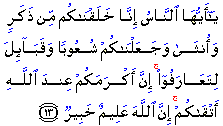Mutual Knowledge, Discerning Own Faults, Jahiliyyah
Issue 579 » April 30, 2010 - Jumada al-Awwal 16, 1431
Living The Quran
Mutual Knowledge
Al-Hujurat (The Chambers) Sura 49: Verse 13
 "O people! Indeed We created you from a male and a female, and made you into tribes and nations so that you might know each other. The most noble of you in the sight of God is the one who is most God-fearing. Indeed, God is All-Knowing, Completely Aware."
"O people! Indeed We created you from a male and a female, and made you into tribes and nations so that you might know each other. The most noble of you in the sight of God is the one who is most God-fearing. Indeed, God is All-Knowing, Completely Aware."
We all have emotional scars, spiritual disabilities, and stubborn desires that make us less than perfect mirrors for God's divine light. This is why we need to live our faith in community with others - so they can help illuminate our flaws and support us in our spiritual growth. But our growth will be limited unless our communities reflect the diversity of human experience. Parochialism has been an inescapable reality for much of humanity since we first inhabited the earth. In our era, for most people who are not impoverished, parochialism is a choice. It is possible in an age of niche marketing and virtual communities, when we have email list-serves, webpages, radio and TV channels catering to narrow, special interests, to limit our contact to those who reflect our own perspectives and experiences and who do not challenge us to expand our frames of analysis. To do this violates the teaching of the Quran that diverse communities were created by God precisely for the purpose of mutual knowledge, which itself must lead to greater self-knowledge.
Compiled From:
"The Story of The Quran: Its History and Place in Muslim Life" - Ingrid Mattson, pp. 231, 232
Understanding The Prophet's Life
Discerning Own Faults
God's Messenger, peace be upon him, declares: "You are governed how you are (according to your beliefs and lifestyle.)" [Hindi, Kanz al-Ummal, 6:89]
This hadith expresses a principle of public and political administration: A country's political structure is shaped according to its people's tendencies, whether directly through democracy or indirectly through other ways. Both the natural and the social sciences have their own laws, which we call "God's creational and operations laws of the universe." According to these laws, if people immerse themselves in sin and evil, they inevitably will be ruled by evil people. If, by contrast, they prefer a virtuous life, their government will be good.
The hadith stresses that laws have no sanction on their own; rather, their authority depends on those who apply them. Therefore, the character of government officials is of vital importance. The ruling elites are like the cream rising to the surface of a liquid: milk has its own kind of cream, as do lime and alum. When Hajjaj, a despotic commander, was reminded of Umar's justice, he replied: "If you were like Umar's people, I would be like Umar."
The hadith also tells us to develop self-control and discern our own faults. Social harmony cannot be established if people tend to blame others.
Compiled From:
"The Messenger of God: Muhammad" - Fethullah Gulen, pp. 102,103
Blindspot!
Jahiliyyah
Can we brand a society as one of jahiliyyah, or ignorance, on the basis of the practices of its people? Islam does not slam on such a blanket verdict on the basis of behaviour. It may describe the behaviour itself as belonging to a social pattern or pagan ignorance, as we see in three of the four instances where the word occurs in the Quran: judgement [5:50], women's appearance [33:33] and strong emotions [48:26]. In none of these cases, however, does Islam brand the whole of society as pagan or ignorant. In fact, Islam acknowledges that everyone is capable of committing sinful actions, including serious ones. It urges those who slip into sin to repent so that they can earn God's forgiveness.
A society can be branded as ignorant, or jahili, if it upholds concepts about God that are contrary to His oneness and His essential attributes [3: 154]. It cannot be branded as such on the basis of the behaviour of certain sections in it.
Compiled From:
In the Shade of the Quran, "Introduction" - Adil Salahi, Vol 16, pp. x-xxiv